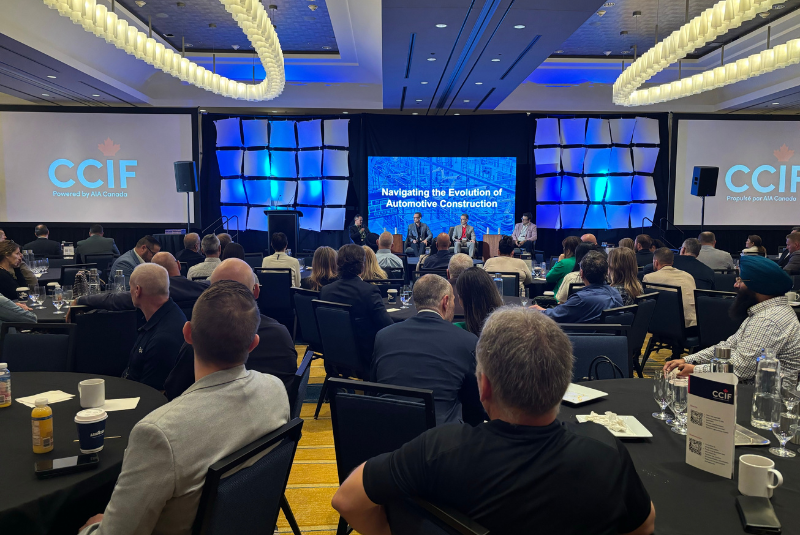The second Canadian Collision Industry Forum (CCIF) event in 2024 brought together many players in the automotive industry to discuss about the latest developments, challenges and opportunities.

Last September 20, in Montreal, the Canadian Collision Industry Forum (CCIF) attracted many professionals : collision repairers, insurers, dealers, original equipment manufacturers (OEMs), educators, suppliers and service providers.
Working better together: Insights from original equipment manufacturers and suppliers
Kicking off CCIF Montréal was an enlightening and engaging panel discussion about the challenges OEMs and suppliers face in automotive construction and how these challenges can be overcome by working together and implementing seamless processes.
Attendees tuned in to listen to industry experts Matt Bannister, owner of Titanium Tools and Equipment, Brian Chiu, category manager of Collision & Wholesale for Nissan Group of North America, Vince FIlice, president of Les Équipements & Services Filco Inc., and Rene Levy, senior field sales manager for Henkel Canada Corporation.
Empowering employees and navigating trends
Renaude Poirier, training coordinator at Innoviste, spoke about Innoviste’s initiatives and plans to address skills gaps in the motor vehicle industry. From intervention methods, impact measurement approaches, training techniques, and navigating change in a constantly evolving industry, attendees were left with valuable insights to help their businesses succeed.
“We want productivity in Quebec, but we know that as technologies evolve, it is a challenge for companies and then for workers to make them their own.” said Poirier. “At Innoviste, we have developed on-the-job apprenticeship programs to help collision sector employees gain training and further their professional development.”
Introducing I-CAR Canada training in Quebec
Director of Training and Program Manager, Compétences VÉ, at the Provincial Council of Joint Committees of the Automotive Services Industry (CPCPA), Philippe Bussières, dove deep into the key players of the Quebec market, their roles, as well as the training offered through the CPCPA’s program, primarily focusing on the body shop sector.
Additionally, Philippe provided attendees with insights on the collaborative efforts between CPCPA and I-CAR Canada, including the introduction of I-CAR Canada training to the Quebec market and the available certification courses.
“The purpose of certification is to make sure that the person who is doing the job is going to do it better—to complete safe, proper, and quality repairs.” said Bussières. “At the CPCPA, we have 78 training manuals available for the whole of Quebec. We want to be there for the industry and help people improve and be better.”
Turning sustainable practices into policy
After a lunch and networking break, Bill Brower, senior vice president of North America claims and global industry relations of Solera spoke on how critical it is for the collision industry to embrace sustainable practices. Sustainability is not just a need, but a customer preference as well—Solera’s findings show that 75 per cent of drivers would switch to an insurer that offers more sustainable, environmentally-friendly policies. However, it can be challenging to track and manage emissions data.
To solve this, Solera has launched Sustainable Estimatics, allowing insurers to easily measure data and reduce carbon emissions. Throughout this session, Bill showcased various reasons this initiative can help businesses succeed.
“Sustainable estimatics is a solution that aims to help insurance companies measure and offset their carbon dioxide impact for auto repair and across the claims continuum.” said Brower. “Consumers are interested in working with companies focused on eco-friendly processes, and so using this is a way to attract more customers while meeting regulatory reporting requirements.”
Diving into the future of collision repair
The future of collision repair is undergoing a significant transformation, driven by technological advancements and a growing emphasis on sustainability. To close out the event, Strategic Account Manager – Canada for BASF Canada Inc., Benjamin Perrier, dives into the various emerging technologies and challenges and how businesses can navigate the future of the collision repair sector.
“What we also need to keep in mind is that no other industry undergoes evolutions like the ones we see today. Soon, we will start to see the real impacts of these changes in the coming years.” said Perrier. “The trends we’re going to see for bodywork, and therefore in the paint field, if we project over the next five years, will show that colors will alter the permittivity of radar waves. We will then have color formulas specifically adapted to radars to allow waves to pass through correctly.
For instance, automakers increasingly integrate advanced materials into vehicle designs, necessitating specialized skills among repair technicians. Additionally, autonomous vehicles are becoming increasingly common, causing some employees to revisit their repair strategies. Other trends include energy efficiency, adopting green policies, data-driven diagnostics, and conducting precise vehicle repairs.
See you at CCIF Toronto
CCIF Montréal was an incredible day of connecting and learning about industry trends, challenges, and innovations. These sessions and discussions were a prime example as to why CCIF conferences are a valued event for learning and networking with collision industry professionals.
Looking ahead, we are excited to introduce the Canadian Auto Care Industry Conference (CAIC), where CCIF Toronto will take center stage. This two-day event, running from March 19-20, 2025, will unite professionals from the mechanical and collision sectors to dive into hot topics, industry trends, and the current state of the auto care sector. With a packed schedule that includes industry-wide programming, networking opportunities, and collision-focused sessions, the CAIC is the place to be for anyone invested in the future of auto care.



